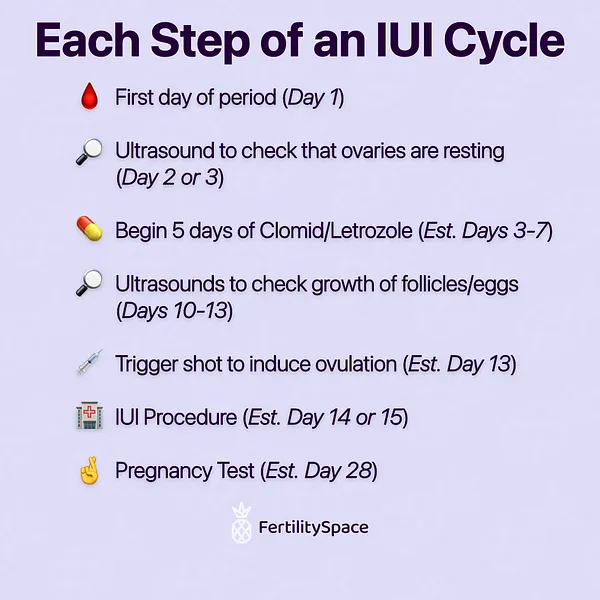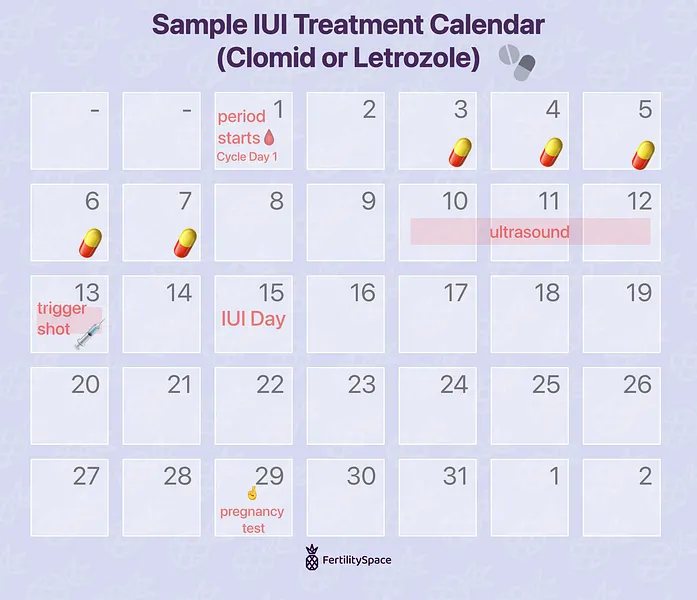Guides
Video
Fertility Expert
IUI Timeline From Start to Finish - Sample Treatment Calendar for Intrauterine Insemination
Dr. Kurt Peterson is a fertility doctor at Nevada Fertility Center in Las Vegas.
The IUI process takes place over the course of a typical menstrual cycle, so you can think of this treatment all taking place within the timeframe of about one month.
There are some variations in the exact number of days that you will take medication and how many ultrasounds you have depending on the type of protocol your fertility doctor gives you as well as your unique fertility status. However, the rest of the timeline for intrauterine insemination is basically the same for everyone.
The easy thing to remember when it comes to fertility treatments such as intrauterine insemination is that everything begins with the start of your period. The first day of your period is considered to be Day 1 of the menstrual cycle.
This is when your clinic will normally give you instructions for your IUI cycle, such as a treatment calendar, dates to come in for an initial ultrasound, and your medication instructions.
We spoke with fertility doctor, Dr. Kurt Peterson of Nevada Fertility Center, to learn all about the IUI timeline from start to finish.
The IUI Timeline - Day by Day
Ok, so we know that the first day of your period marks Cycle Day 1, what’s next?
In a nutshell, Dr. Peterson shares that an IUI cycle is “broken down into roughly two weeks of meds, monitoring, and an insemination procedure followed by two weeks of waiting to test for pregnancy”.
So let’s go day by day for each step of this process.
Typically your fertility doctor will have you come in around Day 3 of your menstrual cycle for an initial ultrasound. This ultrasound is done to confirm that the ovaries are resting, Dr. Peterson shares.
The next step will be to start taking fertility medications that will encourage your ovaries to start developing follicles.
Each follicle contains an egg and in an IUI cycle, doctors may try to recruit a few follicles to help increase your chance of success with intrauterine insemination.
The IUI Timeline with Clomid or Letrozole is Essentially the Same
The most common fertility medication to take for an IUI cycle is either Letrozole or Clomid.
Although Clomid and Letrozole have different ways of working in the body to help you develop an egg for ovulation, the end result they bring about is essentially the same (to grow eggs) and take the same amount of time.
Both medication options, Clomid and Letrozole, are pills which you take orally for 5 days.
Here is a sample IUI cycle treatment calendar so you can see each step.
Here is a sample IUI cycle treatment calendar so you can see each step.
Your fertility doctor will then have you return to the clinic sometime around Day 10-13 for another one to two ultrasounds so that they can check that your ovaries are developing follicles in response to the medications.
IUI trigger shot and Insemination Procedure
So, how does your doctor know when it’s time for the insemination?
Your doctor is looking at the ultrasound to measure the size of the follicles in your ovaries. Once they are large enough, follicles ≥ 18 mm, then it is time for the next stage of the IUI cycle - the trigger shot.
The trigger shot induces ovulation and has a very specific timeframe. After you take the trigger injection, an IUI typically takes place 24-36 hours later.
This is because an egg should have now been released from your ovary into the fallopian tube, so your doctor wants to time the insemination as close to this event as possible in order to optimize the insemination procedure so that the sperm can reach the egg in time.
Eggs have a narrow window of time during which they can be fertilized, so it’s important to time the insemination as closely as possible with ovulation.
The trigger shot is usually taken about two weeks into the IUI cycle, the same timeframe as when you would normally ovulate in a typical menstrual cycle.
Each step of the IUI Process
🩸 First day of period (Day 1)
🔎 Ultrasound to check that ovaries are resting (Day 2 or 3)
💊 Start 5 days of Clomid or Letrozole (Estimated Days 3-7)
🔎 Ultrasounds to track growth of follicles containing eggs (Days 10-13)
💉 Trigger shot to induce ovulation (Estimated Day 13)
🏥 IUI Procedure, sperm wash and insemination (Estimated Day 14 or 15)
🤞 Pregnancy Test (Estimated Day 28)
What day of the cycle is the IUI done?
It depends on how quickly your body responds to the fertility medications but an IUI is typically done mid-cycle around Day 14, similar to the typical time of ovulation.
The IUI is always done 24-36 hours after the trigger shot, so you likely cannot be sure of the exact day of your IUI until your doctor tells you which night to take the trigger injection.
So really, the timing of an IUI cycle is very similar to what a typical menstrual cycle timeline would be.
It’s just that you’re very closely monitoring your body’s progress through the cycle and taking medications to help control all of the timing and make sure that you do actually ovulate.
When can you take a pregnancy test after the IUI procedure?
After the insemination procedure, the final step is to take a pregnancy test to confirm whether or not the treatment was a success.
You can take a pregnancy test 14 days after the insemination procedure, so there are two weeks of waiting to see whether you got pregnant from the IUI cycle.
And that is the entire IUI timeline!
There aren’t nearly as many steps involved compared to an IVF cycle. Not sure whether you need to do IUI or IVF? Check out our video where Dr. Matrika Johnson of Reproductive Specialists of the Carolinas explains when to skip IUI and go straight to IVF.
Hopefully this makes the process seem much clearer and easy to understand.
Want to learn more about Intrauterine Insemination (IUI)?
💡 Check out our Guide to IUI video with Dr. Peterson where he answers common questions about IUI and talks more about who this treatment works best for.
💌 Questions for Dr. Peterson? Contact his team here!
👩⚕️ Looking for a fertility doctor? Find a fertility clinic.
🧪 Learn all about fertility testing with Dr. Matrika Johnson.

